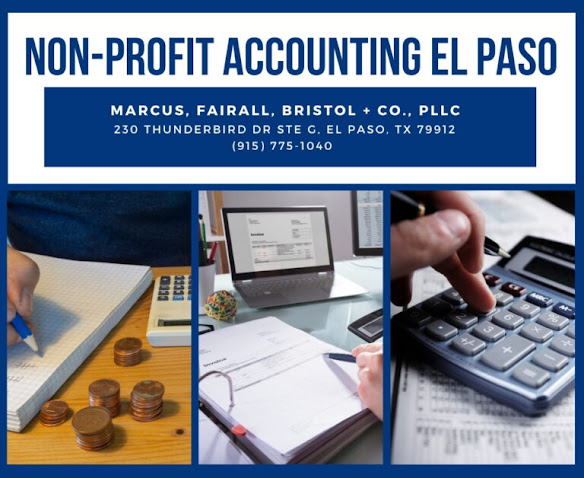Accounting for Non-Profit Organizations in El Paso, TX
Volunteerism is a hallmark of Marcus, Fairall, Bristol + Co., PLLC. Our community-oriented partners at Marcus, Fairall, Bristol + Co., PLLC are active volunteers in the local community, and we encourage our staff to get involved in their favorite non-profit.
If you've been involved in the non-profit world in El Paso or Las Cruces, New Mexico for any length of time, you've almost certainly met one of our professional accountants. As non-profit accounting specialists, they help non-profit organizations file for tax-exempt status and set up the necessary accounting systems, including assisting the agency with appropriate reporting and disclosure policies.
Submit an application for tax-exempt status.
Because non-profit organizations are exempt from many taxes, the agencies must keep meticulous records to ensure compliance with federal requirements.
Non-profit organizations are prohibited by definition from making a profit outside of the scope of the organization. They are not permitted to distribute profits to directors or members of the organization other than through legitimate salaries; profits must be used for philanthropic purposes.
To receive the tax advantages of a non-profit organization, you must first apply for tax-exempt status. (This means that the entity wishing to be tax-exempt must file an application for non-profit status with the IRS.) Tax-exempt refers to net income and/or profits that are not subject to federal, state or local taxation.
Tax exemption entails a slew of reporting requirements that must be met. We will set up your reporting, bookkeeping, and payroll systems, as well as assist you in preparing your organization's incorporation documents.
For more information, please contact us by email at info@marcfair.com or by phone at (915) 775-1040.
Accounting for non-profit organizations
If you are forming a new non-profit organization, we can assist you in preparing your 501 (c)(3) application for tax-exempt status.
Here's what's required...
- Articles of Incorporation containing the Exempt Purpose Statement as described in IRS Code section 501(c)(3) and defined in Treasury Regulation 1.501(c)(3)-1 Paragraph d and the Dissolution Statement described in Treasury Regulation 1.501(c)(3)-1 Paragraph b subparagraph 4 (“Organizational Test”).
- Employer Identification Number
- By-laws of the Organization
- Minutes of Board Meetings
- Names, Addresses, and Resumes of Board Members
- Names and addresses of all Active Members
- Inventory of Assets like cash, furniture, equipment, property, pledges…
- Inventory of Liabilities like mortgages, accounts payable, loans…
- Rent/Lease Agreements and Contracts
- Revenue and Expense Statement for the last four years or as far back as possible if your organization has been in existence for less than four years.
- Written Reason for Formation and History of the organization.
- Organization Mission Statement or Statement of Faith or Beliefs for Churches and other Religious Organizations.
- Organization Activities, Operations and Programs Documentation including your statement of purpose & operations, food programs, fundraisers, flyers/brochures/pamphlets…
- Financial Support Documentation including all sources of revenue like contributions, tithes, offerings, fundraisers…
- Fund Raising Program Descriptions
- IRS Processing/Filing Fee




Comments
Post a Comment